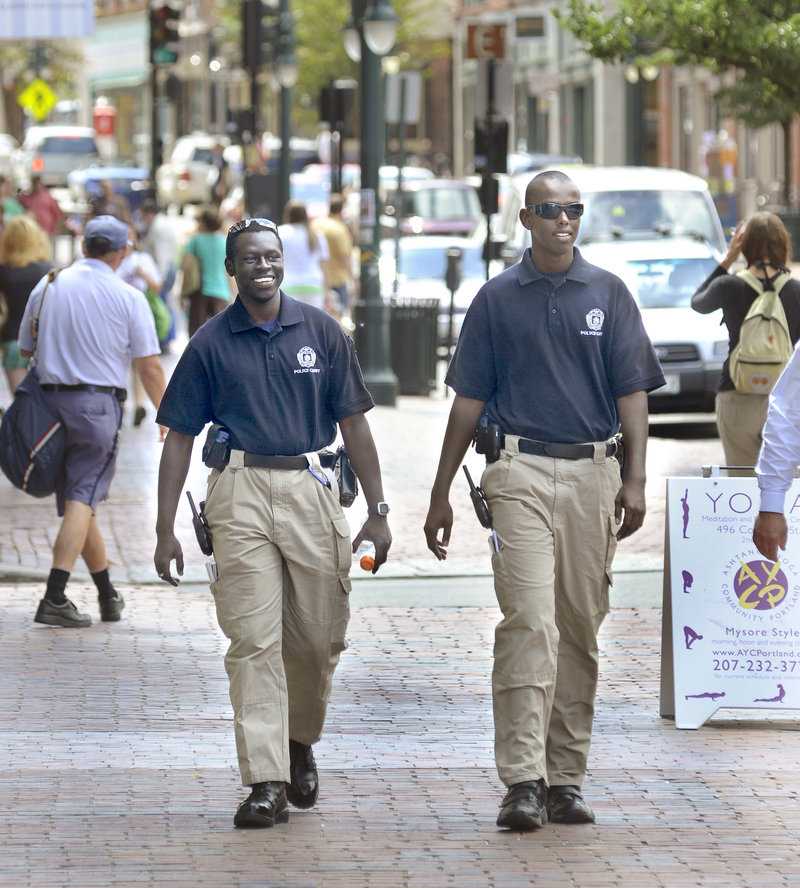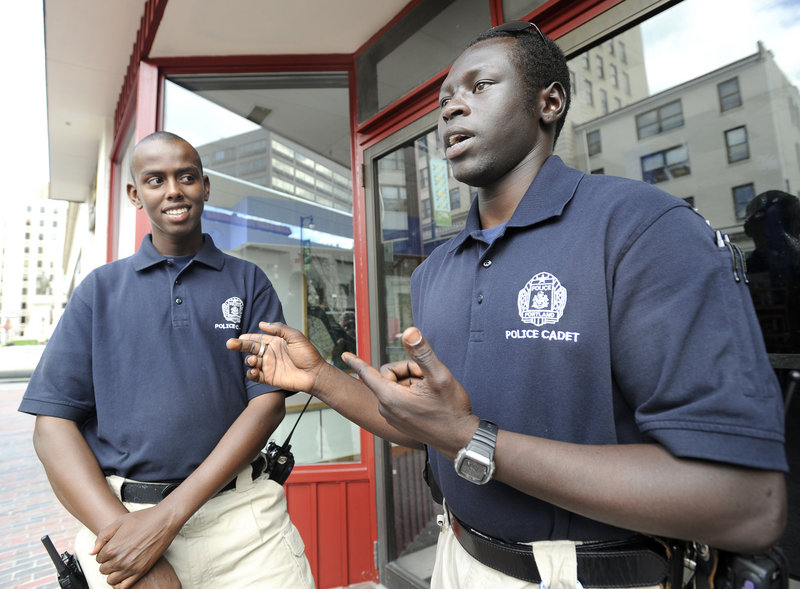PORTLAND – When Iman Ali and Ater Ater play the video game “Grand Theft Auto,” they choose to drive the police car and bring in the bad guys.
So for the two young men studying law enforcement, working as a Portland Police Department cadet is the perfect summer job.
They have been walking the beat, making contacts with local businesspeople and serving as intermediaries between police and the community.
“When we started, we each took a turn talking to different businesses” along the Congress Street corridor, Ater said. “We asked them, what are your problem spots? Are there any groups that are bothering you?”
The department had a cadet program for years, and many of its successful officers started there. But it lapsed as budgets tightened.
This summer, the department was able to get a $7,500 grant from the Maine Community Foundation’s People of Color Fund to resurrect the program and hire its first two cadets in nine years.
Ater and Ali stand out as they stride down Congress Street, wearing crisp navy-blue polo shirts and khaki pants, with a cell phone, radio, walkie-talkie and pepper spray hanging from their utility belts. They work their way down to the waterfront, checking side streets and alleys and periodically stopping in Tommy’s Park.
Business people say the pair are articulate and polite, good ambassadors for the department who help keep problems like aggressive panhandlers in check.
“I think just being around, it shows if you need something, they’re there for you,” said Joe Graffam, who runs a hot dog stand on Monument Square.
Graffam remembers encountering police cadets at the Portland International Jetport, and he reels off the names of people who became lieutenants and detectives.
“They all started out like that,” he said.
Commander Vern Malloch, the third-highest-ranking officer in the department, was a cadet after he passed the civil service exam but before he could attend the Criminal Justice Academy. He spent his three-month stint working at the department’s information desk.
In addition to beat work, Ater and Ali have helped out on underage alcohol stings, where the department checks to see if stores or bars are selling to people under 21, Malloch said. They have worked on the Police Athletic League programs and helped with administrative tasks.
In the 1970s and ’80s, the program operated year-round, with cadets working in the evidence and property room, dispatch and records. Then it was scaled back to just summers, before being eliminated altogether.
The program was resurrected this year with the People of Color Fund grant. The goal of the fund is to invest in emerging leadership and support organizations that serve communities of color. Successful applicants must operate a program that has people of color in a leadership position or that provide services to an identifiable community of color.
With Police Chief James Craig, an African-American, leading the department, its application met both criteria.
The department’s cadet program required that candidates had to be a person of color, a high school graduate and enrolled in a law enforcement program.
Ater, 19, is entering his second year at Southern Maine Community College’s three-year law-enforcement program, and Ali, 18, is entering his first year in the program.
Both are members of Portland’s Police Explorers Post, a group affiliated with the Boy Scouts of America that focuses on law enforcement. Ater is the chief of the post, Ali the lieutenant.
The Explorers program focuses on learning and involves constant supervision, but as cadets they are largely on their own, Ali said.
“We’re being trusted to be out on the street and doing our jobs,” he said. In the process, they’re getting valuable experience.
The program benefits the department both now and in the long term, Malloch said. The cadets help the department build bridges with two of the city’s prominent immigrant communities, and, if they join the force, they will help the department reflect the community it serves.
Ali speaks Somali, and Ater speaks the Sudanese language Dinka.
For now, though, they are civilians — without police academy training and arrest powers. They can ask panhandlers to move along or boisterous youth to settle down, but for criminal activity or potentially dangerous situations, they call in the professionals.
“That’s not for us to handle,” Ater said.
Not yet.
Staff Writer David Hench can be contacted at 791-6327 or at:
dhench@pressherald.com
Send questions/comments to the editors.




Success. Please wait for the page to reload. If the page does not reload within 5 seconds, please refresh the page.
Enter your email and password to access comments.
Hi, to comment on stories you must . This profile is in addition to your subscription and website login.
Already have a commenting profile? .
Invalid username/password.
Please check your email to confirm and complete your registration.
Only subscribers are eligible to post comments. Please subscribe or login first for digital access. Here’s why.
Use the form below to reset your password. When you've submitted your account email, we will send an email with a reset code.